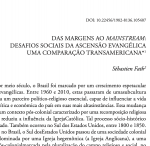 Debates do NER is a Brazilian biannual journal, created in 1997 on the initiative of the Center for the Study of Religion (NER), of the Graduate Program in Social Anthropology at the Federal University of Rio Grande do Sul (UFRGS).
Debates do NER is a Brazilian biannual journal, created in 1997 on the initiative of the Center for the Study of Religion (NER), of the Graduate Program in Social Anthropology at the Federal University of Rio Grande do Sul (UFRGS).
Debates do NER is currently one of the most important vehicles for disseminating research related to the Social Sciences of Religion in Mercosur. Thanks to my Brazilian colleagues Marcelo Camurça and Emerson Giumbelli, whom I warmly thank, I had the opportunity to publish in 2020 a comparative historical study on Evangelicalism, USA vs Brazil.
Brazil has been marked, over the last fifty years, by a recomposition of its religious landscape. Its main characteristic is the spectacular decline of Catholicism, even if it remains dominant, in favor of evangelical Protestantism (Miller & Morgan, 2019). These Evangelical, Pentecostal, charismatic, neopentecostal churches used to be confined to the margins. They are now mainstream in Brazil, although they remain in the minority. They participate in large-scale geopolitical recompositions (Dieckhoff, Portier, 2017). They defend a "Christianity of conversion" rooted (or not much) in the Protestant heritage, in which the practical effectiveness of the faith and the local association of militants prevail.
On the ethical level, these evangelicals are reputed to defend positions described as "conservative", and a rather patriarchal moral order, in opposition to the social liberalization which has accelerated since the 1970s. This Brazilian evangelical progression is often reported to American evangelism which remains very powerful today. In both cases, one is tempted to paint the stable and enduring idealtype of an inherently conservative, reactionary, populist and socially rather retrograde evangelical Christianity.
The theoretical hypothesis underlying this article is to examine this static vision more closely from a dynamic and comparative perspective, which will be based on two processes:
-the geographic decentering, with a case study on the South of the United States
-the temporal decentering, with a look back at two 50-year sequences: the years 1800-1850 in the South of the United States (the Bible Belt), and the years 1970-2010 in Brazil.
Four reasons explain the methodological interest of this comparison.
-The first is that Brazil is now on the way to resemble the American Bible Belt. Brazilian society is impacted by tens of millions of evangelicals supported by media, televangelists, missions that draw the contours of a militant subculture.
-The second reason for this comparison is the shift, in both cases, from an established Church (the colonial Anglican Church, in the southern United States, the colonial Catholic Church, in the case of Brazil), to a plural Christian landscape marked by evangelical development.
-The third reason is the passage, in both cases, from an evangelical culture "of the margin" (ultra-minority), to a mainstream evangelical posture, endowed with a real prescriptive power over the mainstream media, culture and politics.
-The fourth interest of the comparison is the religious issue of the transition from a slavery/colonial society to a post-slavery/colonial society.
The purpose of this article is to invite comparison by focusing on the US case, from which the Brazilian case is examined.